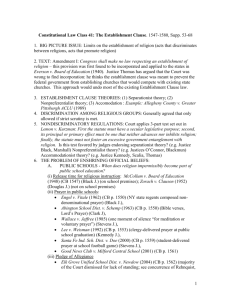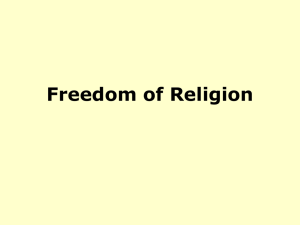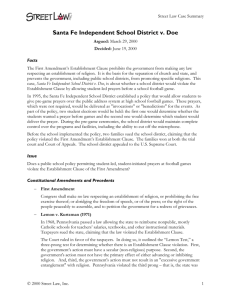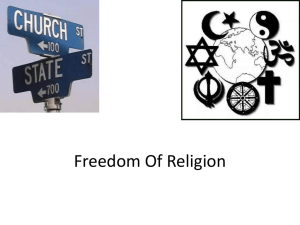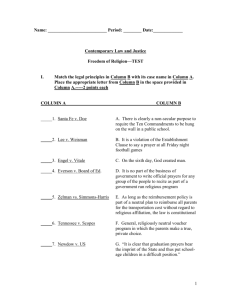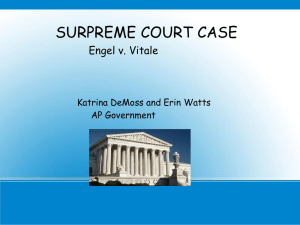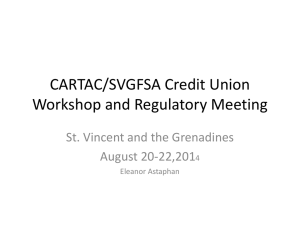File
advertisement
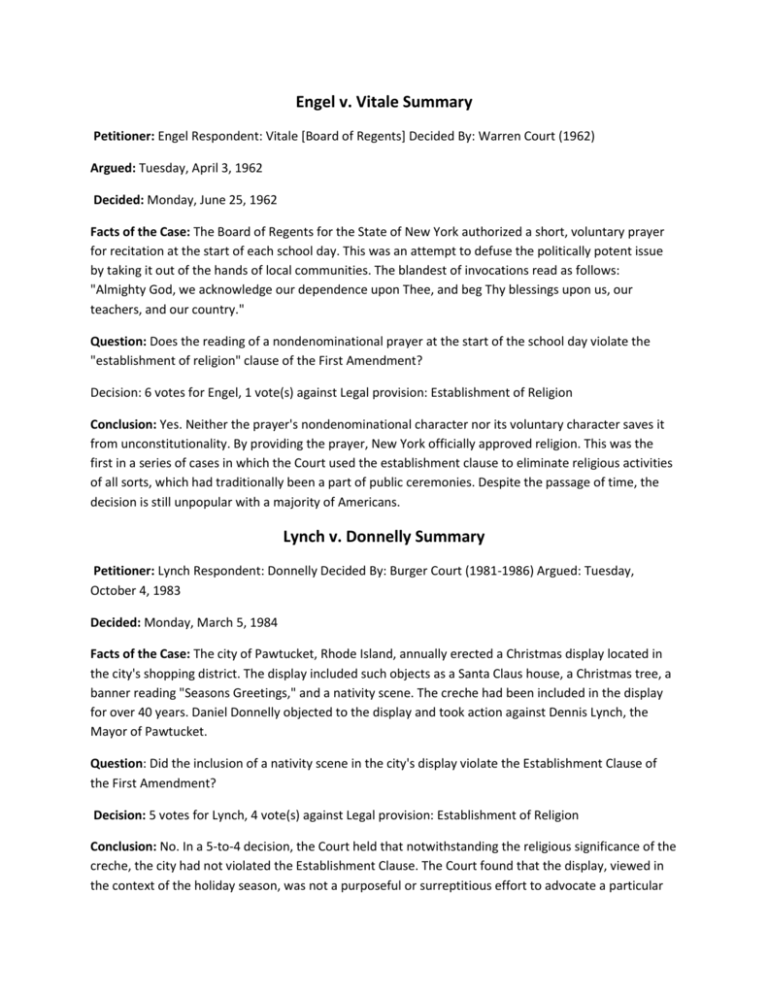
Engel v. Vitale Summary Petitioner: Engel Respondent: Vitale [Board of Regents] Decided By: Warren Court (1962) Argued: Tuesday, April 3, 1962 Decided: Monday, June 25, 1962 Facts of the Case: The Board of Regents for the State of New York authorized a short, voluntary prayer for recitation at the start of each school day. This was an attempt to defuse the politically potent issue by taking it out of the hands of local communities. The blandest of invocations read as follows: "Almighty God, we acknowledge our dependence upon Thee, and beg Thy blessings upon us, our teachers, and our country." Question: Does the reading of a nondenominational prayer at the start of the school day violate the "establishment of religion" clause of the First Amendment? Decision: 6 votes for Engel, 1 vote(s) against Legal provision: Establishment of Religion Conclusion: Yes. Neither the prayer's nondenominational character nor its voluntary character saves it from unconstitutionality. By providing the prayer, New York officially approved religion. This was the first in a series of cases in which the Court used the establishment clause to eliminate religious activities of all sorts, which had traditionally been a part of public ceremonies. Despite the passage of time, the decision is still unpopular with a majority of Americans. Lynch v. Donnelly Summary Petitioner: Lynch Respondent: Donnelly Decided By: Burger Court (1981-1986) Argued: Tuesday, October 4, 1983 Decided: Monday, March 5, 1984 Facts of the Case: The city of Pawtucket, Rhode Island, annually erected a Christmas display located in the city's shopping district. The display included such objects as a Santa Claus house, a Christmas tree, a banner reading "Seasons Greetings," and a nativity scene. The creche had been included in the display for over 40 years. Daniel Donnelly objected to the display and took action against Dennis Lynch, the Mayor of Pawtucket. Question: Did the inclusion of a nativity scene in the city's display violate the Establishment Clause of the First Amendment? Decision: 5 votes for Lynch, 4 vote(s) against Legal provision: Establishment of Religion Conclusion: No. In a 5-to-4 decision, the Court held that notwithstanding the religious significance of the creche, the city had not violated the Establishment Clause. The Court found that the display, viewed in the context of the holiday season, was not a purposeful or surreptitious effort to advocate a particular religious message. The Court found that the display merely depicted the historical origins of the Holiday and had "legitimate secular purposes." The Court held that the symbols posed no danger of establishing a state church and that it was "far too late in the day to impose a crabbed reading of the [Establishment] Clause on the country." Santa Fe ISD v. Doe Summary Petitioner: Santa Fe Independent School Dist. Respondent: Doe Decided By: Rehnquist Court (1994-2005) Argued: Wednesday, March 29, 2000 Decided: Monday, June 19, 2000 Facts of the Case: Prior to 1995, a student elected as Santa Fe High School's student council chaplain delivered a prayer, described as overtly Christian, over the public address system before each home varsity football game. One Mormon and one Catholic family filed suit challenging this practice and others under the Establishment Clause of the First Amendment. The District Court enjoined the public Santa Fe Independent School District (the District) from implementing its policy as it stood. While the suit was pending, the District adopted a new policy, which permitted, but did not require, studentinitiated and student- led prayer at all the home games and which authorized two student elections, the first to determine whether "invocations" should be delivered at games, and the second to select the spokesperson to deliver them. After the students authorized such prayers and selected a spokesperson, the District Court entered an order modifying the policy to permit only nonsectarian, nonproselytizing prayer. The Court of Appeals held that, even as modified by the District Court, the football prayer policy was invalid. The District petitioned for a writ of certiorari, claiming its policy did not violate the Establishment Clause because the football game messages were private student speech, not public speech. Question: Does the Santa Fe Independent School District's policy permitting student-led, studentinitiated prayer at football games violate the Establishment Clause of the First Amendment? Decision: 6 votes for Doe, 3 vote(s) against Legal provision: Establishment of Religion Conclusion: Yes. In a 6-3 opinion delivered by Justice John Paul Stevens, the Court held that the District's policy permitting student-led, student-initiated prayer at football games violates the Establishment Clause. The Court concluded that the football game prayers were public speech authorized by a government policy and taking place on government property at government-sponsored school-related events and that the District's policy involved both perceived and actual government endorsement of the delivery of prayer at important school events. Such speech is not properly characterized as "private," wrote Justice Stevens for the majority. In dissent, Chief Justice William H. Rehnquist, joined by Justices Antonin Scalia and Clarence Thomas, noted the "disturbing" tone of the Court's opinion that "bristle[d] with hostility to all things religious in public life."
